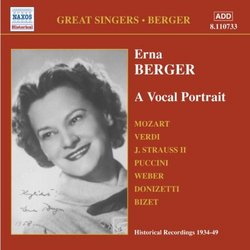| All Artists: Wolfgang Amadeus Mozart, Carl Maria von Weber, Daniel-Francois-Esprit Auber, Friedrich von Flotow, Gaetano Donizetti, Giuseppe Verdi, Giacomo Puccini, Georges Bizet, Johann II [Junior] Strauss, Josef Krips, Bruno Seidler-Winkler, Thomas Beecham, Johannes Schuler, Leo Blech, Hans Schmidt-Isserstedt, Walter Schültze, Walter Süsskind, Philharmonia Orchestra of London, Berlin Philharmonic Orchestra, Berlin State Opera Orchestra Title: Erna Berger: A Vocal Portrait Members Wishing: 0 Total Copies: 0 Label: Naxos Original Release Date: 1/1/1934 Re-Release Date: 3/18/2003 Genres: Pop, Classical Styles: Vocal Pop, Opera & Classical Vocal, Historical Periods, Classical (c.1770-1830), Modern, 20th, & 21st Century Number of Discs: 1 SwapaCD Credits: 1 UPC: 636943173329 |
Search - Wolfgang Amadeus Mozart, Carl Maria von Weber, Daniel-Francois-Esprit Auber :: Erna Berger: A Vocal Portrait
 | Wolfgang Amadeus Mozart, Carl Maria von Weber, Daniel-Francois-Esprit Auber Erna Berger: A Vocal Portrait Genres: Pop, Classical |
Larger Image |
CD Details |
CD ReviewsHow to sound under age meeting advanced challenges. John Austin | Kangaroo Ground, Australia | 10/03/2003 (4 out of 5 stars) "Admirers of this German soprano, whose life spanned almost the entire C20, are well served in the CD market. Naxos has added this selection of her recordings to their "Great Singers" series, providing much that is best known of her operatic work as well as several rarities. Although you will not find the best ever version of any of the operatic arias heard here, you will hear accomplished vocalizing from a singer renowned for her accuracy of pitch and control of tone. Track 1 is a justly famous recording, the first, I believe, to present the aria Martern aller Arten in its entirety. Erna Berger presents a Constanze who contrives to repel the threat of torture by showing that she can participate for nine minutes in elaborate coloratura with four solo instruments and full orchestra without betraying any fear. This, and several of the other recordings made in London, benefit greatly from having orchestral accompaniments in charge of conductor Josef Krips. Ward Marston's remastering seems to have involved more noise reduction processing than any of the other Erna Berger CDs with which I have compared it. The statement "All tracks are sung in German" on the cover is not correct, but it helps explain that these recordings were made at a time when opera was sung in the language of the country where the singer worked." Razor-sharp precision but a girlish, flute-like voice lackin Discophage | France | 09/21/2007 (3 out of 5 stars) "Razor-sharp precision (more in the second Queen of the Night aria than in the first, though), suitably fiery characterization (a welcome change from the placid and plangent Queen of the Nights in those days), but a girlish, flute-like timbre, very pure and angelic in pieces like Flotow's "Letzte Rose" from his opera "Martha", acceptable in Bohème (a Mimi sounding 15 year-old, why not?) but lacking "beef" and unable to fully convey the range of emotions of the more dramatic characters (Konstanze, Queen of the Night, Violetta), giving it all a somewhat superficial air of German operetta (and everything IS sung in German, by the way, except the aria from Weber's rare Ines de Castro) rather than flesh and blood. Meet Erna Berger, soprano coloratura of a bygone era. Good transfers."
|
